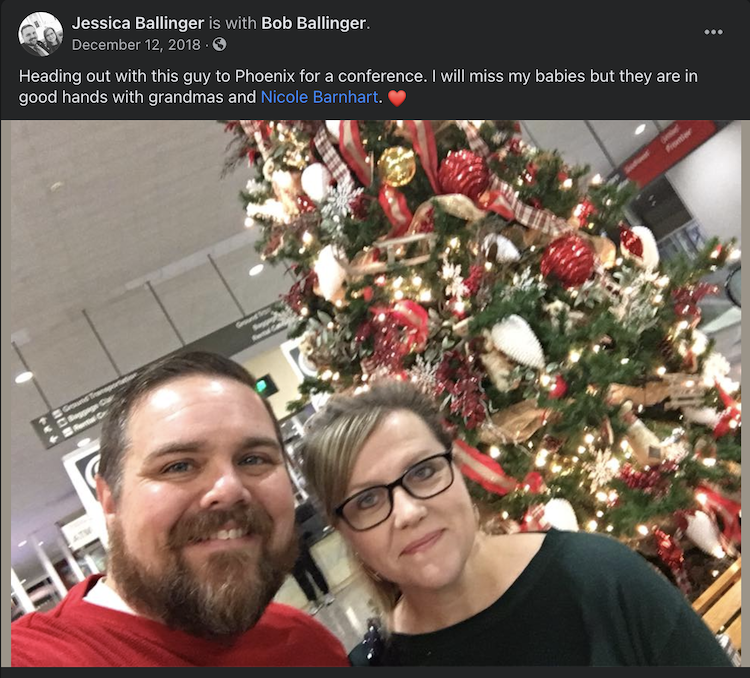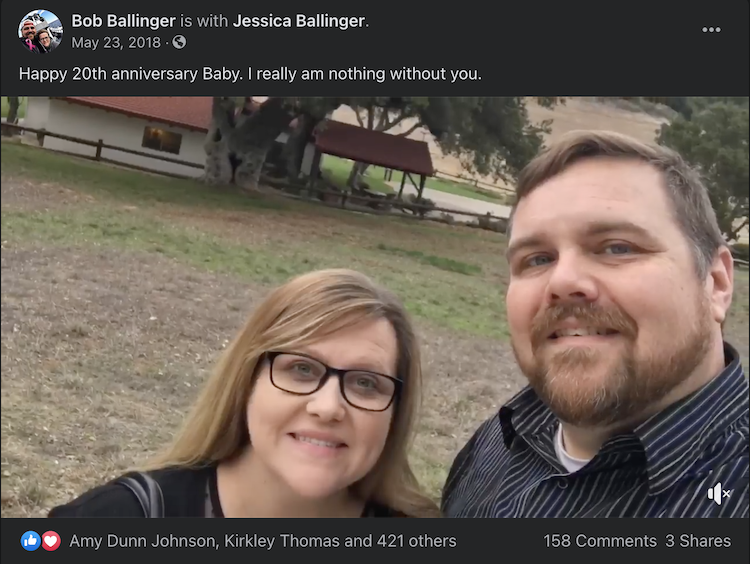State Senator Bob Ballinger (R-Ozark1) has never been a particularly big fan of transparency. When then-Representative Jana Della Rosa introduced a bill in 2015 that would have required that Campaign Contribution & Expenditure (“CC&E”) reports be maintained in a usable, searchable database, Ballinger was the only legislator to vote against it in committee. His (laughably stupid) reasoning? Because his “old accountant” could not possibly figure out the internet well enough to file such reports. More recently, he voted for a bill that purported to create a database similar to what Della Rosa had proposed, but which also quietly removed the requirement that people file electronic CC&Es at all.2
Why does Ballinger hate pellucidity in government record-keeping, you ask? Well, were I to hazard a guess, I would say it is because the kind of surface-level grifting and misfeasance that he is into is frequently uncovered by even the most basic transparency. For example, his Statements of Financial Interest showed just how reliant his real-estate-closing business was tied to whatever was going on at Ecclesia College.3 Or who can forget all the public records that showed just how close and shady his ties were to the medical-marijuana licensing decisions?
I was reminded of all of this a few days ago, when I looked at Ballinger’s 2017 and 2018 CC&Es. While I didn’t find any donations from Josh Duggar (which was the reason for looking in the first place), what I did find was a pattern of fictitious or inflated mileage “reimbursements” from Ballinger to his wife, at least one obviously illegal/improper payment of campaign funds to his wife for personal use, at least one other personal use of campaign funds, an unallowable campaign debt, dozens of improperly reported expenditures that violate the Arkansas Ethics Commission’s rules, and some odd spending habits that just seemed out of place. In short, it seemed like it would be worthwhile to do a deep dive into this while much of it is still within the three-year statute of limitations for the Ethics Commission.
Background.
Ballinger was first elected to the Arkansas House of Representatives in 2012, and he was re-elected in 2014 and 2016 as well. He ended his 2016 campaign with $1,636 cash-on-hand. In June 2017, he announced that he would be running for Arkansas Senate for District 5 in 2018, taking on incumbent Senator Bryan King (R-Green Forest) in the 2018 primary. On July 17, 2017, Ballinger filed seven CC&Es that should have been filed months between January and June 2017, six of which were for his House campaign account, while the seventh was for his Senate race.

These belatedly filed CC&Es for his House campaign account contained some red flags. January 2017 showed Ballinger spending $200 on Facebook ads and $293 on advertising through something called Pin Depot Network, plus $38 in nonitemized spending. February 2017 contained $43 in nonitemized spending. March 2017 had $444 in spending ($33 nonitemized).
The April 2017 CC&E had $25 in contributions and $188 in nonitemized spending, bringing his House campaign coffers to $455. Then, in May 2017, he apparently spent $820–aka $365 more than he had in his House account–on a $400 ticket to the Lincoln Day dinner, $189 on Facebook ads, and $231 in nonitemized spending. Finally, the June 2017 CC&E contained a $450 loan from Ballinger to the campaign, $160 in contributions, and $278 in nonitemized spending, leaving the House account with a negative $32 balance.4
On the same day that he filed those six House-campaign CC&Es that he should have been filing monthly to that point, he also filed a June 2017 CC&E for his nascent Senate race. This report contained a bizarre $50 loan from Ballinger to the Senate campaign (rather than the still-negative House campaign), as well as $29,990 in contributions. The massive red flags and questionable relationships visible in these contributions are laid out in this post.
All of which brings us to the CC&Es that he filed between October 2017 and January 2019. So let’s dive in.
Mileage “Reimbursements.”
Ballinger’s third-quarter 2017 CC&E covered the period from July 1 through September 30, 2018. In it, he showed $3,805 in contributions and $8,176.33 in expenditures, none of which were for any mileage reimbursement. Three months later, the fourth-quarter 2017 CC&E listed $13,710 coming in and $9,165 going out. Included in those 4Q expenditures is this entry:

Starting in 2018, Ballinger was required to file monthly CC&Es. His reports for January, February, and March 2018 contain no mileage reimbursements. In April 2018, however, there are two mileage payments on the same day from the campaign to Jessica Ballinger totaling $1,959.92:

The 2018 Preferential Primary was on May 22, 2018. On May 15, Ballinger paid his wife $800 for mileage reimbursement:

Then, on June 3, Ballinger paid her another $456.00:

In July, with his campaign over $6,000 in the red due to spending over $16,000 on his campaign consultant, Ballinger listed a “loan” from Jessica Ballinger for $610.44. The CC&E did not specify that this loan was for mileage, but, a month later, in the August 2018 CC&E, Ballinger listed two reimbursements to his wife, including one for $610.44:


On September 18, Jessica Ballinger received another $247.17 in mileage reimbursement:

The 10-Day Pre-Election CC&E, which covered the period of 10/1/18 through 10/27/18, contained no mileage reimbursement. However, the 2018 Final Report, which covered October 28 through December 31, 2018, listed three payments to Jessica Ballinger, two of which were for mileage: $974.24 on October 30 and $129.37 on November 13.5


The reimbursement rate for campaigns in 2018 was 42 cents per mile, and these payments to Jessica Ballinger total $5,721.09, which works out to 13,621.6 miles driven. Given the size of District 5 (2404 square miles), a total of 13,621.6 could be somewhere in the realm of possibilities.
As with all things Bob Ballinger, however, the problems appear when you scratch below the surface even the tiniest bit.
First, as noted above, there was no mileage claimed between July and September 2017, suggesting that the December 20, 2017 reimbursement of $675.74 amounts to 1,608.9 miles driven between October 1 and December 20. Possible? Sure. But it becomes less believable when you account for the fact that Jessica Ballinger was pregnant through this entire period–she gave birth on December 30–and had a one-year-old, a five-year-old, and four kids between 6 and 14 that she was homeschooling at the time.
That December 30 birth of the Ballinger’s youngest would certainly explain why Jessica Ballinger did not claim any campaign mileage in the first three months of 2018. But then we get to April 2018, when she received two payments on the same day (4/23), totaling $1,959.92. Are we to believe that she drove 4,666.5 miles in 23 days, for an average of nearly 203 miles per day? While caring for a three-month-old, a toddler, and a five-year-old, as well as homeschooling four kids of different ages and grades?6
More importantly, the CC&E that included the two April 23 payments was the 10-Day Pre-Election report for the May 22 primary, so it covered the period of April 1 through May 12, 2018. So how in the world could there be a payment of $800 on May 15? Did Jessica Ballinger drive 1,904.8 miles on behalf of the campaign between Sunday, May 13 (Mother’s Day) and Tuesday, May 15? Even if you assume she did nothing but drive and spent no time actually at events or talking to potential voters, that’s about thirty hours minimum of driving in the span of 72 hours. No chance.
Ignoring the $800 that was obviously not for mileage, but treating the rest of the pre-primary mileage reimbursements as legit, we get a total of $2,635.66, which represents 6,275.4 miles driven by Jessica Ballinger. Given how hotly contested this primary was–Ballinger ultimately defeated the incumbent Bryan King by 374 votes out of 8,116 votes cast–that number is feasible enough, even with the kids and homeschooling stuff. And, while Ballinger had opponents in the 2018 general election, the chances of a Democrat or Libertarian winning Senate District 5 in 2018 were absolutely nil.7 So, even assuming that the pre-primary mileage was real, you would expect the mileage payments to drop off post-primary.
Instead, in the June 2018 CC&E, we have a payment to Jessica Ballinger for $456.00 on June 3. Now, the prior report8 covered the time period between May 12 and May 22 (the date of the primary). Why would Ballinger’s wife have driven 1,085.7 miles for the campaign in the twelve days immediately following the primary?
Oh…wait. On Ballinger’s campaign Facebook page, there is a post from May 11, 2018, where he is changing a flat tire on the van and noting that the campaign miles have been “hard on tires.”

Checking the Carroll County Assessor’s website for their 2018 assessments, we see that this van was a 2008 Dodge Grand Caravan SE. That particular type of van takes P225/65R16 tires. Tires that size go for anywhere from $75 to 115, meaning that $456 is right about what you would expect to spend for four new P225/65R16 tires mounted and balanced, which is exactly the kind of thing that you would do at the end of the primary.
Can you use campaign funds to pay for something like new tires? In a word, no. As the Ethics Commission explains, “Maintenance costs should be paid from personal funds, not campaign funds, as the rate per mile necessarily includes depreciation and anticipated maintenance costs.”
So between May 23 and June 30, 2018, Ballinger paid no real mileage reimbursements. Then, from July 1 through October 27 (the end date on the 10-Day Pre-Election report), Jessica Ballinger was reimbursed for $1181.82 (2813.9 miles). Which makes a reimbursement payment for $974.24 (2319.6 miles) on October 30 nonsensical, at least if we’re supposed to believe that she accrued all of those miles between 10/28 and 10/31. Even if you assume those miles were cumulative between September 189 and October 30, those, plus another $129.37 (308 miles) on November 13, mean that Ballinger paid his wife $2,285.43 for miles driven between the primary and a general election in which the outcome was never in doubt and Ballinger won by over 37 points.
Big picture, we have an $800 payment that was pretty clearly not for actual mileage, a $456 payment that was more likely for tires than for mileage reimbursement, and $4,486.09 in reimbursement payments where the date of the specific payments frequently don’t make sense based on the dates on the reports. Luckily for us, there is a chance that someone will be able to get to the bottom of some of these questions. Under section 211 of the rules promulgated by the Ethics Commission, when it comes to mileage reimbursement, “The campaign must maintain records showing the date of travel, destination(s) involved, purpose of travel and odometer readings of each trip for which reimbursement is allowed.” Moreover, “The candidate will be held responsible to ensure that accurate odometer readings are maintained.” An ethics complaint that raises these issues would, in theory, require Ballinger to provide these odometer logs that he is required to maintain. Interesting.
Personal Use of Campaign Funds #1.
On the final CC&E, filed on December 31, 2018, Ballinger listed three payments to his wife. Two were for mileage on October 30 and November 13, respectively, which we dealt with above. The third was a nice, round payment of $1,000 to Jessica Ballinger on December 12.
We can say for certain that this third payment was not for mileage, for at least two reasons. First, she had been paid for mileage on October 30 and November 13, and the election was November 6. Ethics rules do not allow for the payment of mileage driven after the general election except for narrow situations which do not apply here. Second, and more tellingly, Ballinger listed $1,103.61 for his total “Travel Expenses” on that final report, which is exactly what the other two payments to Jessica Ballinger total.

Meaning that even Bob Ballinger was not pretending like that last $1,000 was mileage reimbursement.
So what was it for? Well, if you look at Jessica Ballinger’s Facebook page, you’ll find this post, wherein Jessica notes that she is headed to Phoenix with Bob for a conference:

The astute among you might have noticed that the date on that post is December 12, the same date as the mysterious $1,000 payment from Ballinger. A look at Ballinger’s 2018 SFI shows that the Heartland Institute paid for his “Conferance [sic] Registration, hotel for two nights, food and travle [sic]” for a conference that was December 13 and 14, 2018.
On December 17, 2018, Jessica again posted about the trip, noting how much fun she’d had:

So…you have Bob Ballinger giving his wife $1,000 from campaign funds on the same day that the two of them fly to Phoenix for a trip that they apparently extended beyond the December 14 end date of the conference that Bob was attending? The money wasn’t for mileage, by Bob’s own admission. What conclusion can one reach here other than the campaign gave Jessica money either to cover her part of the travel and the additional nights in a hotel, so she would have some money to do something fun while Bob was at the conference, or both. No other explanation makes sense.
If you are the kind of person who has been around here since 2013, you may be yelling at whatever device you’re reading this on, “Hey, Matt! Didn’t Mark Darr do something similar and have his campaign pay for his wife’s travel to an event? And wasn’t that one of the things that the Ethics Commission found that Darr had done wrong?” To which I would respond, “Check out the big brain on Brad! That’s right; they did cite him for that!”
Personal Use of Campaign Funds #2.
On May 21, 2018–the day before the primary–Ballinger listed a $250 charge at Locke Mountain Cabins in Mountainburg, Arkansas. Looking at the prices at Locke Mountain, $250 appears to be either two cabins for one night or one cabin for two nights. Now, we know that Ballinger was in Mountainburg on May 20:

Is it possible that Ballinger rented a cabin in Mountainburg so that he would not have to drive down there the day of the library opening or drive back that night? I suppose. But Mountainburg is only 90 or so miles from where he lived at the time, so spending two days down there in the final days of the campaign would not make any sense at all.
What would make sense? Well, what if I told you that the Ballingers’ anniversary is May 23–the day after the primary–and that May 23, 2018, marked their 20th anniversary?

Do you think they might have wanted to get away for a couple of nights to celebrate their 20th anniversary after 10 months of campaign-related activity and stress and after they didn’t really get to dedicate time to Mother’s Day (May 13) or Jessica’s birthday (May 14) a little over a week earlier?
Yeah, so do I.
Importantly, I should note that it does not really matter if this was one cabin for two nights or two cabins10 for one night. In either scenario, Ballinger is taking campaign funds for personal use.
Flawed CC&E Reports Generally.
Section 218 of the Ethics Commission’s rules for candidates states (emphasis added):
The report disclosing a campaign expenditure for goods or services must describe the category(ies) of goods or services received in exchange for the expenditure. It is not sufficient simply to list the payee.
That is pretty straightforward: every expenditure has to have something in the description blank, and it is explicitly not enough to simply list who you paid. Yet, even if you only look at CC&Es that are still within the Ethics Commission’s jurisdictional timeframe, there are nine improper expenditure entries on the May 2018 report, seven in June, nine in July (literally none of the July entries were complete), four in August, three in September, nine in the 10-day pre-election report (another report without a single correct entry), and fifteen (!!) in the final report. That is a grand total of FORTY-SEVEN expenditure entries that were not reported correctly, compared to twenty entries that did have a description.
His failure to include expenditure description is even more surprising considering his work history in the real estate title industry, which requires listing any and all expenses in excruciating detail. Though, maybe this is just another in a long line of reasons why he no longer works in that industry.
Similarly, when it comes to listing debts that are owed by the campaign in the final report, the Ethics Commission’s rules say that “Matters which will not be considered as legitimate campaign debts include, but are not limited to…mileage on behalf of the candidate or any member of the candidate’s immediate family, unless said mileage was regularly paid by the candidate throughout the campaign.” However, Ballinger’s final 2018 report specifically includes this entry:

A review of his CC&Es shows that at no point during the entire 2018 senate campaign did Bob Ballinger pay himself for mileage reimbursement. Which makes him a candidate who did not “regularly pay [mileage reimbursement to himself] throughout the campaign.” Which, in turns, makes this claimed campaign debt illegitimate. Great job, Bob.
Even more confusingly,11 the Final Report also lists an unpaid loan from Jessica Ballinger to the campaign for $610.44. Of course, this was obviously paid off back in August with the payment of $610.44 on August 23, so it should not be listed on the final report as an outstanding campaign debt.
While not as serious as personal use of campaign funds, these glaring errors with the basics of completing CC&Es are still absolutely ridiculous. After all, the 2018 senate race was his fourth campaign in six years. If, after that many attempts at filing quarterly and monthly reports, Ballinger still cannot properly document expenditures or understand what constitutes a legitimate campaign debt on his final report, do we chalk that up to gross incompetence, intentional failure to comply with the rules, or something worse?
Maybe the Ethics Commission can get to the bottom of this with the information provided in the complaint that is being submitted today.

By way of Hindsville, via Berryville↩
His “old accountant” will be thrilled to hear that, I suppose. But, seriously, SB699/Act 1029 suuucks.↩
Fun fact: Not long after that post noted that Ballinger had left Integrity Closing off of his 2017 SFI, he amended the SFI to include it as “Inactive in 2017.” Thanks for helping prove my point, Robbo.↩
All told, these reports contained $811 in nonitemized spending.↩
We’ll come back to the third payment, a $1,000 check on December 12.↩
Even if you assume she had some mileage in March that just wasn’t billed until April 23, you still have the issue of caring for a newborn, a toddler, and five other kids, while homeschooling at least four of them.↩
Ballinger would ultimately win the general election by over 37 points.↩
The one containing the $800 payment↩
The date of her prior reimbursement payment according to Ballinger’s reports↩
Maybe the kids came along and got their own cabin?↩
And, by “confusingly,” I mean “indicative of just how bad at this Ballinger is”↩